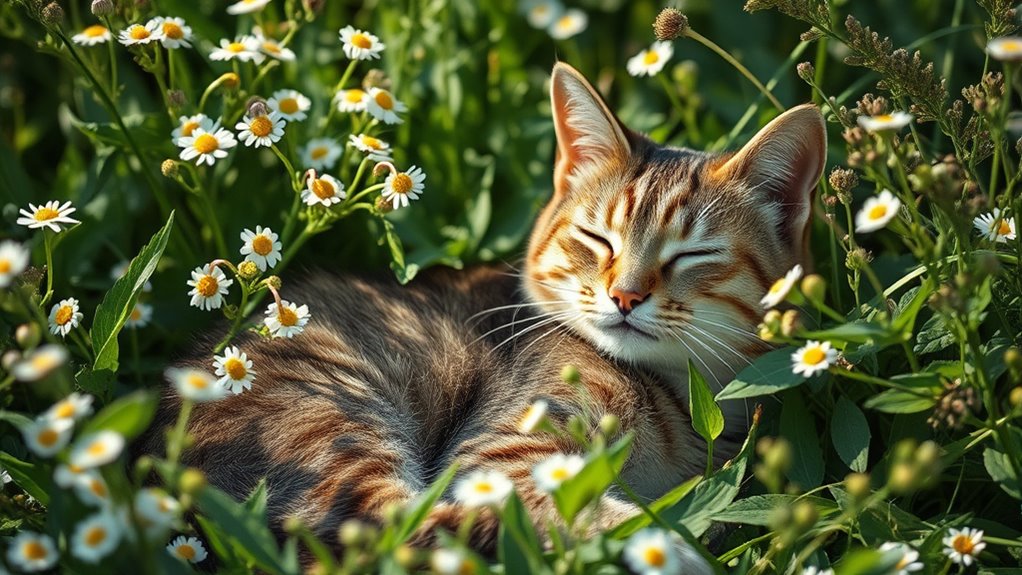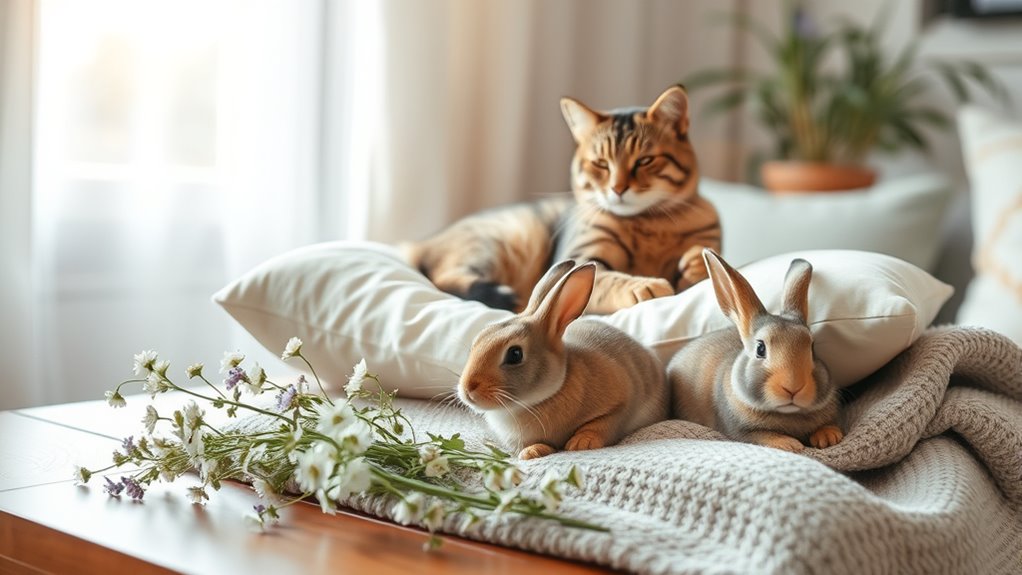If your stressed pet needs calming support, wild chamomile and valerian can be gentle, effective options. Chamomile helps ease nerves and anxiety, especially during fireworks or thunderstorms, while valerian promotes relaxation and better sleep. You can prepare chamomile as a tea to mix into food or water, and offer valerian capsules or tinctures, ensuring proper dosage. When used responsibly and combined with a calm environment, these remedies can improve your pet’s emotional well-being. Curious to learn more?
Key Takeaways
- Wild chamomile and valerian root are natural remedies that can help reduce pet anxiety safely.
- Proper preparation, like brewing chamomile tea and dosing valerian appropriately, enhances their calming effects.
- These herbs interact with the nervous system to promote relaxation without causing sedation.
- Always consult a veterinarian before combining remedies or adjusting dosages for your pet’s safety.
- Using these herbs alongside a calm environment and positive reinforcement optimizes stress relief for pets.

Are you looking for natural ways to soothe your anxious pet? If so, you’re not alone. Many pet owners turn to natural remedies for pet anxiety management, seeking gentle, effective options that don’t rely on pharmaceuticals. Two herbs that have gained popularity for their calming properties are wild chamomile and valerian root. These plants can help reduce stress and promote relaxation in pets, providing a safe alternative or supplement to conventional treatments.
Wild chamomile, known for its soothing effects on humans, also benefits animals, especially when it comes to calming nerves and easing discomfort caused by anxiety. You might notice your pet becoming more relaxed after a chamomile infusion or supplement, especially during stressful events like thunderstorms, fireworks, or vet visits. Chamomile works by interacting with your pet’s nervous system, helping to decrease agitation without sedating them completely. When using chamomile, it’s crucial to prepare it properly—brewing it as a tea and then mixing it into their food or water can be effective, but always consult your vet before administering any herbal remedies. Using natural remedies like chamomile as part of your pet anxiety management plan can be a gentle way to support your pet’s emotional well-being. Additionally, understanding the types of herbal remedies available can help you make informed choices for your pet’s health.
Valerian root is another powerful herb used for its calming effects, especially for pets prone to agitation and restlessness. It contains compounds that influence the nervous system, helping to reduce hyperactivity and promote sleep. Many pet owners find valerian to be particularly helpful during stressful situations or for pets suffering from separation anxiety. You can give valerian in the form of capsules, tinctures, or even teas, but always make certain the dosage is appropriate for your pet’s size and health. It’s a good idea to start with small doses and observe how your pet responds, adjusting as needed under the guidance of your veterinarian. Incorporating valerian into your pet anxiety management routine can be an effective way to help your furry friend feel more secure and relaxed naturally.
Both wild chamomile and valerian root are safe options when used responsibly and in consultation with your vet. They offer a gentle way to address anxiety without the risks associated with some pharmaceutical options. Remember, every pet reacts differently, so patience and careful observation are key. When combined with a calm environment, regular exercise, and positive reinforcement, these herbs can substantially improve your pet’s quality of life. By exploring natural remedies like chamomile and valerian, you’re taking a proactive step to support your pet’s emotional health, helping them feel safe and calm in stressful situations.
Frequently Asked Questions
Are Wild Chamomile and Valerian Safe for All Pet Breeds?
You wonder if wild chamomile and valerian are safe for all pet breeds. While these herbs can help calm some pets, herb interactions and breed sensitivities differ. Always check with your vet before introducing new herbs, especially if your pet has underlying health issues or is a sensitive breed. Some pets might react poorly, so cautious use guarantees safety and effectiveness. Never assume all breeds respond the same way.
How Quickly Do Calming Effects Typically Appear?
When asking about how quickly calming effects appear, timing expectations can vary based on your pet’s individual response. Typically, you might notice calming within 30 minutes to a few hours after administration. Factors like your pet’s size, age, and stress level influence this. Be patient and observe closely, as some animals respond faster than others. Always follow recommended dosages and consult your vet if you have concerns.
Can These Herbs Be Used Alongside Prescribed Medications?
You may wonder if herbs like chamomile and valerian are safe alongside prescribed medications. It’s important to consider herb interactions to ensure medication safety. Always consult your veterinarian before combining herbs with medications, as some herbs can enhance or interfere with drug effects. They can help you determine the right approach, preventing adverse reactions and ensuring your pet’s health stays protected when using natural calming remedies.
What Are Signs of Allergic Reactions in Pets?
Have you ever wondered how to spot pet allergy symptoms? It’s vital to recognize signs of allergic reactions early. Look for itching, swelling, hives, difficulty breathing, or vomiting—these are classic signs of allergic reactions. If you notice these pet allergy symptoms, act fast by consulting your vet. Identifying signs of allergic reactions promptly can prevent serious health issues and keep your furry friend safe and comfortable.
How Often Should I Administer These Herbal Remedies?
You should follow the recommended dosage frequency based on your pet’s size and condition, as well as the herbal potency of wild chamomile and valerian. Typically, giving these remedies once or twice daily works well, but always consult your vet for personalized advice. Monitor your pet’s response, and adjust as needed, ensuring you’re not exceeding safe limits. Proper administration helps maximize calming effects without risking adverse reactions.
Conclusion
By incorporating wild chamomile and valerian into your pet’s routine, you create a calming environment, ease their anxiety, and promote relaxation. You help them breathe easier, feel safer, and find peace. You soothe their nerves, calm their mind, and restore their happiness. With these natural remedies, you nurture their well-being, strengthen your bond, and bring comfort to their life. Together, you foster tranquility, trust, and a happier, healthier pet.









